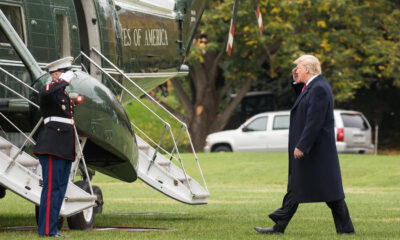Civilization
DoD Needs This Change Agent
Pete Hegseth, former junior combat officer, is exactly the sort of change agent the DoD (Department of Defense) needs.

Success in today’s world favors smart, creative leaders who can quickly adapt and make decisions that benefit their organizations. President Trump’s choice of Pete Hegseth to lead the DoD marks a significant shift from his first administration. Hegseth, with fewer ties to the traditional defense establishment, is expected to transform the DoD in two vital areas: first, he will expose generals and admirals who act out of self-interest; second, he will refocus the military on its core function of lethality—the use or threat of deadly force to win wars and deter enemies.
DoD has many ineffective leaders
Hegseth’s appointment threatens senior military officers who are more concerned with their legacy than with mission accomplishment. These officers feel susceptible to changes that will threaten their carefully curated norms. Many current leaders have avidly promoted DEI (Diversity, Equity, and Inclusion) and CRT (Critical Race Theory), and Hegseth’s threat to remove these programs stokes their fears. These leaders have promoted subordinates who share their views, creating a cycle of making leaders in their own image.
To break this cycle, Hegseth will also need to ensure that general officers are held accountable for the officers they promote. These actions will ensure that his and President Trump’s ‘Warrior Boards’ achieve their desired effect and weed out the right leaders. Civilian leaders and politicians should also scrutinize the retired officers who placed these generals in their positions in the first place. If multiple legacies are at risk, flag officers will develop and implement more objective metrics for recommending general officer positions.
Hegseth’s leadership will refocus DoD on its core purpose. By removing ineffective leaders who prioritize social theories over military effectiveness, he will eliminate a major obstacle. These changes will encourage accountability and forward-thinking approaches. A clear message will echo from the top down that adapting to change means manning, training, and equipping the military to win wars, rather than allowing military officers to succumb to the self-loathing which places individual egos above selfless service to the country.
Officers not wanting to command
Adapting to change is also the responsibility of military commanders. Officers command Army organizations. It is significant that in some branches of the United States Army, up to half of the officers do not desire to compete for Battalion Command. Many reasons include burnout and the threat of investigations that are launched ad nauseam in a zero-defect environment. The Army cannot be effective if officers do not want to command. Commanders hesitate to enforce standards in this environment because an unhappy subordinate can ruin their career with a retaliatory allegation. If an investigation is launched, commanders worry that general officers will dispose of these allegations negatively rather than appear lenient. Secretary Hegseth will support his commanders because his Commander in Chief supports him.
Not supporting your subordinate commanders has vital consequences for national security. A glaring example of a lack of support for the DoD is demonstrated by the contempt of the Chinese in answering Secretary of Defense Austin’s phone calls and his apparent indifference to it. “I think we’ll continue … to stress how important it is, and hopefully Minister Wei will schedule that call.”
A new sheriff
One can hardly imagine Hegseth having the same attitude as Secretary Austin. President Trump proved during his first term, with sanctions and recently renewed threats of another trade war with China, that his government will support its DoD by imposing harsh sanctions and other measures. This whole-of- government approach will allow Hegseth to focus on the military and make its interactions with foreign militaries more effective.
In fact, the Trump transition team is already laying the groundwork for forward-leaning tariff plans through legislation. Because legislation will make it harder to have subsequent administrations revoke these actions, the DoD will benefit from a more permanent government position when it comes to the exercise of economic power. Hegseth will, thus, occupy an even stronger position to engage with military threats to the United States with supporting economic policies that are not just unilateral executive actions by the Trump administration.
President Trump’s selection of Pete Hegseth frees the DoD from being anchored in the change dynamics of the past. Current and future change undercurrents cannot be managed with legacy processes. Leaders must adapt and be free to act outside of institutional norms, especially those tied to a selfish cycle of self-promotion and government social experiments rather than the effectiveness of the DoD.
This article was originally published by RealClearDefense and made available via RealClearWire.
-

 Executive5 days ago
Executive5 days agoWaste of the Day: Secret Settlements get Taxpayer Money
-

 Accountability2 days ago
Accountability2 days agoWaste of the Day: Principal Bought Lobster with School Funds
-

 Constitution1 day ago
Constitution1 day agoTrump, Canada, and the Constitutional Problem Beneath the Bridge
-

 Executive9 hours ago
Executive9 hours agoHow Relaxed COVID-Era Rules Fueled Minnesota’s Biggest Scam
-

 Civilization9 hours ago
Civilization9 hours agoThe End of Purple States and Competitive Districts
-

 Civilization4 days ago
Civilization4 days agoThe devil is in the details
-

 Executive3 days ago
Executive3 days agoTwo New Books Bash Covid Failures
-

 Executive3 days ago
Executive3 days agoThe Israeli Lesson Democrats Ignore at Their Peril













